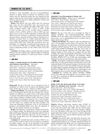 September 2023 in “bioRxiv (Cold Spring Harbor Laboratory)”
September 2023 in “bioRxiv (Cold Spring Harbor Laboratory)” FOL-026 peptide can help repair blood vessels and promote growth, offering potential treatment for vascular diseases.
 97 citations,
July 2006 in “Dermatologic therapy”
97 citations,
July 2006 in “Dermatologic therapy” The document concludes that accurate diagnosis and personalized treatment are important for skin problems in women with PCOS.
 10 citations,
August 2018 in “Dermatologic Surgery”
10 citations,
August 2018 in “Dermatologic Surgery” Laser treatment improves hair density and increases growth factors in androgenetic alopecia.
 1 citations,
July 2023 in “Frontiers in Immunology”
1 citations,
July 2023 in “Frontiers in Immunology” Oxidative stress and immune dysfunction are linked to both Hashimoto's thyroiditis and polycystic ovary syndrome, with diet and specific treatments important for managing these conditions.
 1 citations,
February 2016 in “Revista Brasileira de Ginecologia e Obstetrícia”
1 citations,
February 2016 in “Revista Brasileira de Ginecologia e Obstetrícia” High Lipid Accumulation Product levels are linked to more hirsutism in women with Polycystic Ovary Syndrome.
 2 citations,
January 2023 in “International Journal of Biological Sciences”
2 citations,
January 2023 in “International Journal of Biological Sciences” A specific pathway involving AR, miR-221, and IGF-1 plays a key role in causing common hair loss.
 October 2023 in “Frontiers in endocrinology”
October 2023 in “Frontiers in endocrinology” Androgens and androgen receptors are important for metabolic health, affecting how the body uses glucose and fats through mitochondrial function.
 13 citations,
March 2019 in “Physiological Research”
13 citations,
March 2019 in “Physiological Research” Overweight women with PCOS have higher levels of certain hormones that could indicate a higher risk of heart and metabolic problems.
 15 citations,
April 2018 in “Revista Brasileira de Ginecologia e Obstetrícia”
15 citations,
April 2018 in “Revista Brasileira de Ginecologia e Obstetrícia” Insulin resistance is common in PCOS patients and linked to obesity and increased cardiovascular risk.
103 citations,
December 2021 in “Journal of biological rhythms” Shift work disrupts the body's natural clock, leading to health problems.
 June 2016 in “American Journal of Cardiology”
June 2016 in “American Journal of Cardiology” Endovascular repair and open surgery for abdominal aortic aneurysms both result in a temporary decline in physical health, with no significant mental health difference, and a return to near normal health in 90 days.
January 2016 in “AACE Clinical Case Reports” Treatment restored normal sexual characteristics and blood condition in a patient with testicular cancer.
 1 citations,
January 2006 in “Elsevier eBooks”
1 citations,
January 2006 in “Elsevier eBooks” Cats lose fur due to various reasons, including allergies, infections, genetics, hormones, diet, cancer, stress, and some conditions are treatable while others are not.
 24 citations,
July 2019 in “Journal of Obstetrics and Gynaecology”
24 citations,
July 2019 in “Journal of Obstetrics and Gynaecology” The combination therapy improved PCOS symptoms in both obese and non-obese women, with weight loss in the obese group.
 11 citations,
November 2015 in “Journal of Functional Foods”
11 citations,
November 2015 in “Journal of Functional Foods” Hibiscus petals improved blood sugar and stress responses in diabetic rats.
12 citations,
November 2022 in “Toxics” EtG in hair can help detect alcohol use but may be inaccurate in people with certain health conditions.
 1 citations,
May 2022 in “IntechOpen eBooks”
1 citations,
May 2022 in “IntechOpen eBooks” Obesity leads to physical, metabolic, reproductive issues, higher healthcare costs, and mental health problems.
May 2023 in “Journal of Cosmetic Dermatology” Androgenetic alopecia is linked to higher cardiovascular and metabolic risks, possibly due to irisin resistance.
1 citations,
March 2022 in “Irish Journal of Medical Science” Men with androgenetic alopecia and hypertension may experience more severe COVID-19.
 3 citations,
January 2013 in “Annals of Tropical Medicine and Public Health”
3 citations,
January 2013 in “Annals of Tropical Medicine and Public Health” About 15% of adolescent girls in a region of India have Polycystic Ovarian Syndrome, which is more common in those born by cesarean, with wisdom teeth, or with central obesity.
101 citations,
August 2008 in “Mayo Clinic Proceedings” PAD is common but often missed, needing lifestyle changes and medication for better outcomes.
26 citations,
August 2008 in “Clinical endocrinology” The document concludes that more multidisciplinary research is needed to understand and treat PCOS, a condition that significantly affects women's health and quality of life.
 65 citations,
September 2017 in “British Journal of Cancer”
65 citations,
September 2017 in “British Journal of Cancer” Black ethnicity, prior PSA tests, enlarged prostate, and family history increase prostate cancer risk; Asian ethnicity, obesity, smoking, diabetes, and less sexual activity or no children decrease risk.
 26 citations,
January 2013 in “BMJ Open”
26 citations,
January 2013 in “BMJ Open” Severe baldness on the top of the head is linked to a higher chance of heart disease, especially in men under 60.
 October 2023 in “IntechOpen eBooks”
October 2023 in “IntechOpen eBooks” Genes and epigenetic changes are important in the development of Polycystic Ovary Syndrome.
 5 citations,
January 2006 in “Journal of obstetrics and gynaecology”
5 citations,
January 2006 in “Journal of obstetrics and gynaecology” Metformin can cause hair loss in some women with PCOS.
 43 citations,
October 2019 in “Pediatric Research”
43 citations,
October 2019 in “Pediatric Research” Lifestyle changes are the main treatment for PCOS, which is a complex condition requiring early management to reduce its health impacts.
 8 citations,
September 2017 in “The Journal for Nurse Practitioners”
8 citations,
September 2017 in “The Journal for Nurse Practitioners” Most women with PCOS use positive coping strategies, but some with more psychological stress use negative ones.
 1 citations,
May 2022 in “Frontiers in Pharmacology”
1 citations,
May 2022 in “Frontiers in Pharmacology” Astilbin can potentially calm overactive immune responses, like in Type 1 Diabetes, by suppressing certain cell activities and reducing inflammation.
 3 citations,
April 2022 in “Bioengineering”
3 citations,
April 2022 in “Bioengineering” Ultrasound can help deliver genes to cells to stimulate tissue regeneration and enhance hair growth, but more research is needed to perfect the method.























